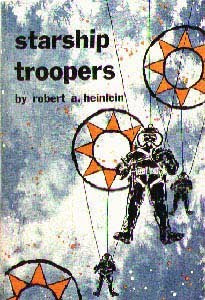
Heinlein has won the most Hugos for novels of any author, and you should get used to seeing his name on this blog. Starship Troopers is one of his most influential and controversial works – one that I read when I was 13 or 14, which is basically the intended audience.
Let me start with a summary of the plot: Johnny Rico joins the space marines and deploys against giant arachnid-like aliens that humans refer to as “bugs.” That’s pretty much all the plot there is.
So, why so influential and controversial?
Well, first of all, this is really the harbinger of a more action-oriented science fiction. This novel more or less creates the popular sub-genre of military science fiction, in which new technologies exist mainly to blow up other beings. It is cracking good fun, and I enjoyed it quite a bit as a young teenager. In fact, Heinlein originally tried to sell this as one of his juveniles. When the publisher of his juvenile novels rejected it as too violent, Heinlein swore off writing for that audience, and his fiction took a more adult turn (including some of the most open sexuality in science fiction until the 90s – wait until we get to the next Heinlein winner).
Also, the space marines fight in powered exoskeletons; this turned out to be another influential aspect of the novel, and came to dominate military sf, sf role-playing games, Japanese manga and anime (I believe there is a Starship Troopers anime out there), and real-life military technology.
As for the controversy, the novel is fairly unapologetic about its militarism. Heinlein makes no effort to flesh out the “bugs” or complicate the space marines. The novel is pure heroic combat of the type usually reserved to 1940s WWII movies. Furthermore, Heinlein portrays (in a very positive light, I’d say) a society in which military service is required for full citizenship. This has led some critics to call the novel fascistic. I think Heinlein’s later novels reveal his politics to be a bit more complex (though no less oddball), but there’s no doubt that Starship Troopers celebrates combat and a simplistic “us vs them” view of military conflict. The over-the-top campy 1998 film actually satirizes this militarism to a large extent, but otherwise has little to do with the novel and, in my opinion, is pretty hard to watch (unless you’re mocking it with friends).
So, I can’t help but agree with a lot of the critiques leveled against this novel, but, at the same time, I have to admit that I enjoyed it quite a bit (and did not turn into a jingoistic warmonger in the process). Considering that it’s a short book, and a fast, compelling read, I don’t have a lot of reservations against recommending that sci-fi fans check it out and decide for themselves.
Grade: A-







